As the school bus lurched to a stop, I grabbed my lunchbox and followed my brother to the front.
I was in fifth grade and life was good. My biggest concerns at the time were what color Fizzie my mom had packed in my lunchbox and what to do about the blister on my hand from playing too much tetherball at recess.
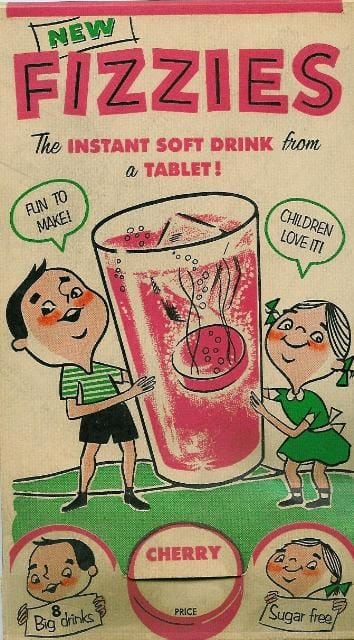
As I stepped off the bus, I smiled at two workers pulling weeds in a nearby yard. (My family was living on a military base in Rota, Spain where my dad was stationed with the US Navy.)
One of the men with a red bandana around his neck elbowed his friend.
“Que gordo!” he shouted.
With a jerk of my head I looked behind me to see who he was talking about.
But no one was there.
When I turned back around, I saw both men looking right at me. And they were laughing.
“How fat!” the man had called out.
And he was talking about me.
I was crushed.
Granted, I wasn’t thin. But until the man with the red bandana shouted that careless, hurtful comment, I’d never once considered my size was any different from anyone else my age.
From that day forward. a cloud hung over my head. Instead of a carefree fifth grader challenging the rest of the class to a game of tetherball, I became a fat girl.
Que gordo.
The power of that hurtful comment had a hold on me for years. In subtle ways, it still does.
In college, I secretly battled an eating disorder. No matter what the scale said, I knew what I was.
Que gordo.
Even now, literally half a century later, I struggle with the woman looking back at me in the dressing room mirror. No matter what size her jeans are, more often than not she looks que gordo to me.

Today, my grandchildren go to school, play sports, and attend church—and I want them to know how to deal with hurtful comments. I want them to know what I didn’t know—
Hurtful comments can’t have power over you unless you allow them to.
In other words, a chair is a chair because at some point someone named it a chair and not a farsakle. We assign the meaning of four legs and a seat to chair, not farsakle. That word is nothing but nonsense.
When we refuse to assign meaning to hurtful words, that’s what they remain:
NONSENSE.
No doubt the man in the red bandana never gave another thought to the fifth grader who innocently stepped off the bus that day.
At nine years old, I didn’t know how to deal with hurtful comments. I had no idea that careless words flung from the mouth of a mean-spirited man were just—words. And I didn’t have to assign meaning to them.
In reality, his words were nonsense.
Yet, I gave those hurtful words the power to influence how I felt about myself for much of the rest of my life.
Words. Are. Powerful.
After all, God spoke the world into existence.
The truth is, hurtful comments are not only powerful, but they can be dangerous.
So also the tongue is a small thing, but what enormous damage it can do. A great forest can be set on fire by one tiny spark.
James 3:5
Hurtful words can’t be unspoken. By the time we utter them, the damage is done.
As a nine-year-old, I thought anything spoken by an adult had to be true.
(Parents, your kids will think that too. For the rest of their lives, they’ll believe what you say about them. Simply because you said it. Even if you speak carelessly or out of frustration or exhaustion.)
At the moment you speak, your words become either a blessing or a curse.
The Bible says words have the power to either give life or destroy it.
Life and death are in the power of the tongue, and those who love it will eat its fruit.
Not many of us are immune to the sting of hurtful words that at one time or another impacted our lives in a negative way. Although sticks and stones may break our bones, words will hurt us, too. In fact, often they hurt long after a broken bone heals.
Fortunately, on the flip side of hurtful words are words that are life-giving.
Nearly all of us can recall the words of a teacher, grandmother, or parent that sparked a fire in us. Words that made them us valuable or loved. Long after they were spoken, those words are still shaping us, motivating us, and giving us purpose and an identity.
The right word at the right time is like precious gold set in silver.
Proverbs 25:11
Words live. For days, years, even generations.
That’s why sometimes we need to help our kids and grandkids learn how to deal with hurtful comments and disarm the power of hurtful words.
HOW TO DEAL WITH HURTFUL COMMENTS BY LOOSENING THE GRIP OF HURTFUL WORDS—
Don’t brush off hurtful comments that sting.
Fight the temptation to tell kids to ignore them or dismiss them as “just words.” Instead, validate the wound the hurtful words have inflicted.
Help kids examine what was said.
With utmost care, help them pick the words apart and make decisions about them. Are they true? Do they line up with what the Bible says is right and good? Should you give them weight or discard them?
The whole Bible was given to us by inspiration from God and is useful to teach us what is true and to make us realize what is wrong in our lives; it straightens us out and helps us do what is right.
2 Timothy 3:16
Help them understand they don’t have to assign power to hurtful words.
In other words, if the words don’t measure up to what is true and helpful and good, deem them nonsense.
But the wisdom that comes from heaven is first of all pure and full of quiet gentleness. Then it is peace-loving and courteous. It allows discussion and is willing to yield to others; it is full of mercy and good deeds. It is wholehearted and straightforward and sincere. And those who are peacemakers will plant seeds of peace and reap a harvest of goodness.
James 3:17-18
Remind them that hurtful comments spoken by one mouth don’t speak for everyone.
It’s important to put things in perspective. Help your child unravel the lie that may have wound its way around his heart. What one person said is carelessness from one mouth. Those words don’t speak for everyone else.
Take it a step farther:
Teach children to be responsible for what they say to others.
Help them understand their words have the capacity to help or hurt other people.
Most importantly, remind them the words they speak are an indication of what’s in their hearts.
A good man produces good out of the good storeroom of his heart. An evil man produces evil out of the evil storeroom, for his mouth speaks from the overflow of the heart.
Luke 6:45
I want to hear from you! What words impacted your life or changed its trajectory?

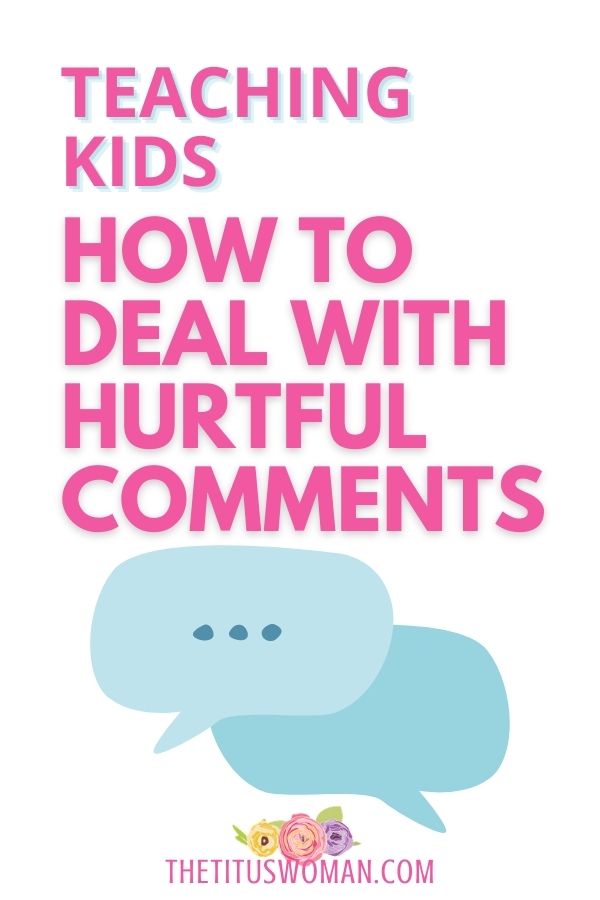
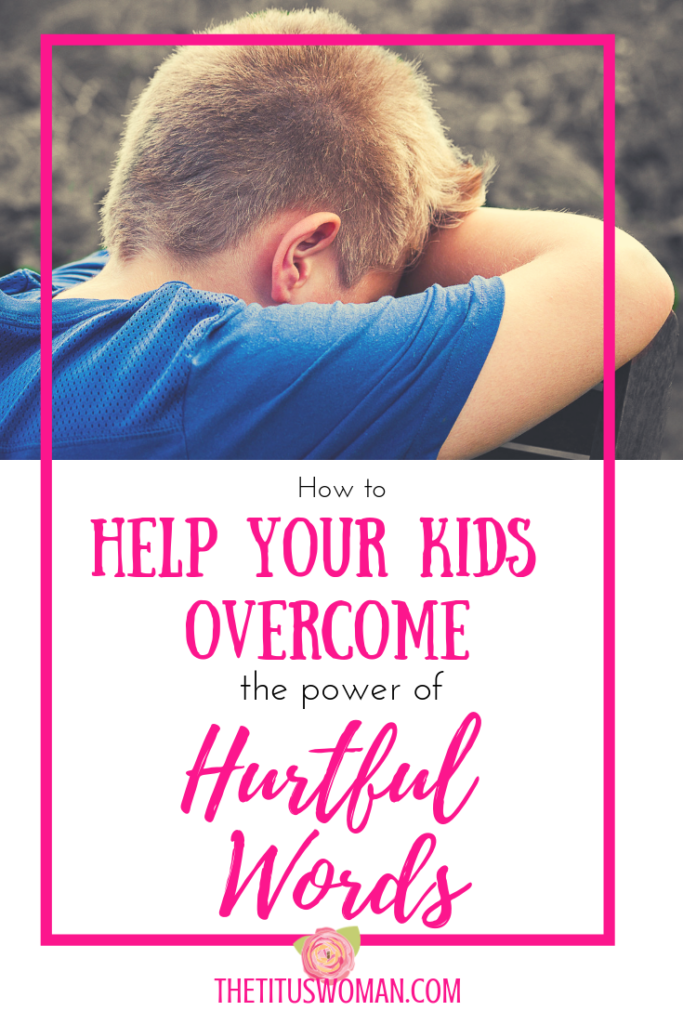

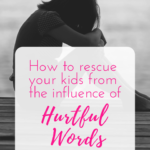
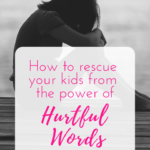
Excellent! As always.
Thank you!
I have add and Tourette’s
Nobody knew. It didn’t have a name. People treated me different. As a kid most didn’t want to sit near me at lunch. Or be on their teams at gym
I had the most Wonderful Christian Mom! She passed away when I was a young girl.
I was labeled by people so often. Lazy, careless forgetful
Didn’t put effort in. It is due to add but until I found out this I thought what is wrong with me? I tried to remember and not forget. To be on time and to pay attention. It wasn’t my fault. As an Adult I’ve learned what people want. Can I be normal, not like others but I fake where I can fake. I know God doesn’t make a mistake and that he loves me so I have learned to let things slide off but I feel the sting at times. I’ve learned that Certain vitamins and nutrients help this ADD. And I’ve been able to better it. But thank you for your well spoken articles. This makes me remember I’m special in Gods plan. 😍
Nanci, I’m so sorry for the emotional pain you’ve experienced. How wonderful that you’ve learned to overcome some of the obstacles of ADD. I pray you know and understand that God loves and accepts you, and that He is with you in every circumstance. Yes, you truly are special to Him and He will use you just as He did now to encourage and inspire me. Thank you for reaching out. I’m saying a prayer for you today.